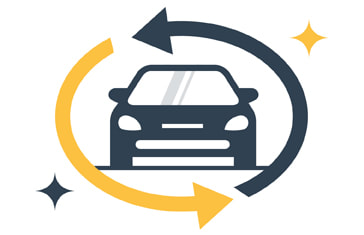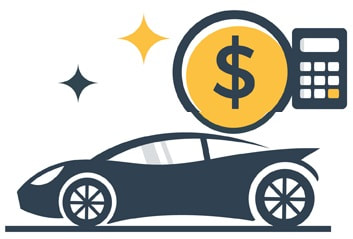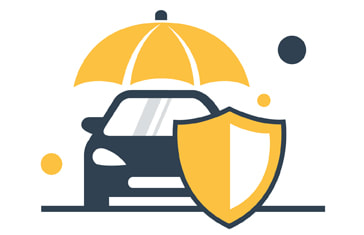How to Refinance Your Car Loan (and the Best Offers) - July 2024
Paying too much for car finance? Sadly, throughout New Zealand, that is all too common. Our guide navigates you through what you need to know, and, most importantly, how you can switch to lower car repayments.
Updated 2 June 2024
Our guide to car refinancing aims to help bring down the cost of car loans. We've published this guide to explain refinance options available, how to minimise ongoing repayments and reduce the total interest costs you pay. We cover:
Our guide to car refinancing aims to help bring down the cost of car loans. We've published this guide to explain refinance options available, how to minimise ongoing repayments and reduce the total interest costs you pay. We cover:
Know This First: What Does it Mean to Refinance your Car Loan?
Refinancing your car loan means paying off your existing car loan with another loan. Most people choose this option when they can save money by refinancing. Sometimes it's a lower rate or better term and other times they need help affording their loan payment, or they risk losing their car.
When done right, you should save hundreds or thousands of dollars by refinancing your car. Before you do, here's what you should know, including how to tell if refinancing is right for you.
Be aware - refinancing a car loan is not right for everyone. Before making any decision, please compare the total costs in detail.
Want to know how much you may be able to save? Our Car Loan Refinance Calculator shows you instantly.
Looking for the best car finance offers? Our dedicated car finance guide has you covered.
When done right, you should save hundreds or thousands of dollars by refinancing your car. Before you do, here's what you should know, including how to tell if refinancing is right for you.
Be aware - refinancing a car loan is not right for everyone. Before making any decision, please compare the total costs in detail.
Want to know how much you may be able to save? Our Car Loan Refinance Calculator shows you instantly.
Looking for the best car finance offers? Our dedicated car finance guide has you covered.
MoneyHub Founder Christopher Walsh shares his comments on car loan refinancing:
|
"Our team, who talks to many reputable car lenders as part of our research efforts, frequently sees verified 9% p.a. and 10% p.a. car loans offered to New Zealanders nationwide. Paying 15%+ p.a. is hard to justify when challenger lenders offer better terms".
"A 5% difference in an interest rate on a $10,000 loan saves about $500 every year - this is a significant saving. But, before you refinance, make sure all the costs are clear - sometimes fees can take a bite out of any savings. If you're in doubt, ask the lender - they must, by law, answer all of your questions with hard numbers". "Car finance is useful but it always traps a lot of New Zealanders into long-term debt. For this reason alone you should carefully consider your options and avoid rushing in to any deal. The numbers need to be affordable - ignore everything else and just look at how much it's going to cost you. Because car loans last for two, three or even five years, making sure you can keep up with the payments is critical to any decision". |
MoneyHub Founder
Christopher Walsh |
How Does Car Refinancing Work?
When you accept a car finance offer, you can later refinance your car loan with a new loan from any lender. You are under no obligation to stay with the same lender. The first step is to contact a lender (online or in-person) to see what rates and terms you may receive. If you are eligible for a better rate or term than you have now, you can refinance.
Before refinancing, there are some crucial facts to be aware of:
The difference between existing and new car finance deals is best explained with two examples:
Situation One
Situation Two
Before refinancing, there are some crucial facts to be aware of:
- If you have a loan with an early repayment penalty, you'll need to take this into account. For example, if the fee is $300 and you have $3,000 left to pay on your loan, refinancing will cost the same as 10% of the loan balance, which is most likely to be bad value for money unless you have a very high-interest rate.
- You'll need to make a complete comparison of costs and interest. You may find you still benefit (i.e. save money) refinancing, but you will need to look at the bottom line.
- To properly compare, add up the total cost of the car financing; this is the interest charges, loan fees, and early repayment fees (if applicable). If it's less than the current total financing cost, then it's probably better you stay.
The difference between existing and new car finance deals is best explained with two examples:
Situation One
- Mike currently owes $10,000 on his car, and he's paying 14.95% p.a. interest on the balance.
- He has 36 months left to repay his loan. Mike's salary has increased since first applying for the car loan, and he knows the interest rate he is paying is too high.
- He applies for refinancing as is offered 8.95% p.a. There are no early repayment fees for either loan.
- There is an application fee of $400; this would be added to the loan balance (bringing it to $10,400) if he goes ahead with the refinancing.
- He puts together a comparison (see table below)
Situation Two
- Mike currently owes $10,000 on his car, and he's paying 14.95% p.a. interest on the balance.
- In this example, he has 12 months left to repay the loan and is offered 12.95% p.a. by another company.
- However, there is a $250 early repayment fee if he refinances which will need to be paid to the current car loan company.
- There is an application fee of $400; this would be added to the loan balance (bringing it to $10,400) if he goes ahead with the refinancing.
- He puts together a comparison:
Car Finance Terms and Details |
Situation One |
Situation Two |
Loan Amount |
$10,000 |
$10,000 |
Interest Rate (existing loan) |
14.95% p.a. |
14.95% p.a. |
Term |
36 months |
12 months |
Current Monthly Repayment |
$346.65 |
$902.58 |
Loan Application Fee |
$400 |
$400 |
Interest Rate (refinancing offer) |
8.95% p.a. |
12.95% p.a. |
New Monthly Repayment |
$330.72 |
$928.90 |
Saving Per Month |
$15.94 |
None - the loan is $26.32 more per month |
Saving Over Remaining Tern of the Loan |
$573.84 |
None - the loan is $315.84 more expensive over its life compared to the existing finance |
Is Refinancing a Better Deal? |
Yes |
In this situation, it's clear that refinancing will be more expensive than the existing loan. This is because the upfront loan fee ($400), which is added to the loan balance, is not enough to offset the lower interest rate. In such cases, the most affordable option is likely to be full repayment with the current lender. |
Source: Car Loan Refinancing Calculator
Warning: Add-on Insurances: Car Lenders may offer you Mechanical Breakdown Insurance (MBI) and/or Guaranteed Asset Protection Insurance (GAP) when you refinance a loan. We do not believe these policies offer value-for-money or cost-effective protection for most people. Our guides to both of these insurance options explain what you need to know. You may be encouraged to buy MBI and/or GAP insurance, but they are not compulsory with any car loan. Our view is that buying add-on insurance makes a car loan more expensive.
|
Christopher Walsh
MoneyHub Founder |
MoneyHub's Top Car Finance Options - Avoid high interest rates and fees with our trusted lenders.
Our Trusted and Affordable Car Lenders Committed to Fast Quotes:
|
How to Arrange the Best Car Refinancing Deal
Refinancing your car is not something you do regularly; if you go ahead, it's important to do it right. Before rushing in to a 'cheaper' car loan, it's worth following three proven steps below. By publishing these steps, we are not giving financial advice or recommending you refinance.
Know This: In most situations, the new lender pays off your existing car loan, and you start a new loan contract, making payments to your new lender. Security is transferred from the previous lender to the new lender, or, registered against the car by the new lender.
Important: Before you take out a new refinance car loan, find out if there are early repayment fees. If you're extending your term or trying to save money by lowering the rate, you may find you can't repay it early without incurring costs. This may decrease the benefit of refinancing.
Don't be caught by fees - interest rates are not the only cost to compare
What fees will I pay?
Fees come in many forms. Before signing any new financing deal, look at administrative fees, early repayment fees, late payment fees and penalties, and any other fees a lender charges upfront or ongoing to determine if refinancing your car loan makes sense.
- The best place to start is to apply with a trusted car finance company that offers low rates and no hidden fees.
- If you're successful with your application, you can compare the offered interest rate (and any associated fees) with your existing loan.
- If it makes sense (financially) to refinance using the new offer, you can accept the loan offer.
Know This: In most situations, the new lender pays off your existing car loan, and you start a new loan contract, making payments to your new lender. Security is transferred from the previous lender to the new lender, or, registered against the car by the new lender.
Important: Before you take out a new refinance car loan, find out if there are early repayment fees. If you're extending your term or trying to save money by lowering the rate, you may find you can't repay it early without incurring costs. This may decrease the benefit of refinancing.
Don't be caught by fees - interest rates are not the only cost to compare
- Each lender charges different fees. Pay close attention and work them into your calculations when deciding if refinancing your car loan is right for you.
- If you refinance into a secured loan (using your car as collateral), you may secure lower interest rates and fee waivers if you also have good credit.
What fees will I pay?
Fees come in many forms. Before signing any new financing deal, look at administrative fees, early repayment fees, late payment fees and penalties, and any other fees a lender charges upfront or ongoing to determine if refinancing your car loan makes sense.
Who is Most Likely to Refinance Their Car Loan?
1. Those contracted into balloon payments - car dealers often offer balloon payments. They can appear to be a good deal - you get a low payment and usually a competitive interest rate. But when the balloon payment comes due, many people are surprised, especially when it's unlikely you can come up with the lump sum owed. In such instances, refinancing your car loan can stretch the amount due out over a few years, allowing you to make monthly payments while paying off the dealer financing loan. This does increase the total interest costs you pay (as the loan is repaid over a more extended period), but it does make it more manageable.
2. Those in a better financial situation - if you qualify for a new loan with a lower interest rate, it's likely you're in a better position financially. If you have increased your salary and/or are in a better financial situation than you were when you arranged your car financing, you may secure a lower rate. However, before refinancing, it's essential to look at the bottom. What are the total fees you're saving? Will the monthly payments plus fees total less than what you'd pay if you kept your current loan? For this reason, you can't focus on the interest rate alone as it's not the only cost to compare.
3. Those needing more flexible terms - If you need more time to pay off your loan (lower payments), refinancing can provide that opportunity. COVID-19 is one example of unplanned life events; when your financial situation changes, it can make it harder to afford your ongoing car repayments. Refinancing your car loan may reduce the rate or extend the term, both of which lower your payments, making them more affordable.
Know This: Refinancing isn't suitable for everyone - if you don't fit into the categories above, it may not be for you. Before making any decision, always triple-check the affordability and total cost of borrowing.
2. Those in a better financial situation - if you qualify for a new loan with a lower interest rate, it's likely you're in a better position financially. If you have increased your salary and/or are in a better financial situation than you were when you arranged your car financing, you may secure a lower rate. However, before refinancing, it's essential to look at the bottom. What are the total fees you're saving? Will the monthly payments plus fees total less than what you'd pay if you kept your current loan? For this reason, you can't focus on the interest rate alone as it's not the only cost to compare.
3. Those needing more flexible terms - If you need more time to pay off your loan (lower payments), refinancing can provide that opportunity. COVID-19 is one example of unplanned life events; when your financial situation changes, it can make it harder to afford your ongoing car repayments. Refinancing your car loan may reduce the rate or extend the term, both of which lower your payments, making them more affordable.
Know This: Refinancing isn't suitable for everyone - if you don't fit into the categories above, it may not be for you. Before making any decision, always triple-check the affordability and total cost of borrowing.
Car Refinancing - Pros and Cons
Pros
Cons
- You may secure a lower interest rate, which means less interest paid over the life of the loan
- A new loan may lower your payments, even if you have to extend the term if your payments aren't affordable
- You may get better loan features including the option to make early repayments
- You may consolidate other personal debt with the car loan if you refinance into an unsecured personal loan. Our debt consolidation loans guide has more details.
- You can switch lenders if you're unhappy with the servicing at your current lender
Cons
- There are almost always costs to refinance, read the fine print to make sure it won't cost you more to take on the new loan
- You may extend your term, which results in paying more interest over the life of the loan because it takes longer to repay the loan
7 Tips for Refinancing your Car Loan
1. Find out all the costs BEFORE making any decision – You don't want to discover after you take the new loan, there are ongoing administrative fees or other charges that increase your payment and decrease your savings. Look at all exit fees from your current loan and setup fees for the new loan and figure them into the total cost.
2. Total the interest – Don't focus on the interest rate alone. Just a lower rate doesn't mean you'll save money. Calculate the total interest you'll pay over the loan's term. If it's a new term (longer), you may find you pay more interest refinancing even with the lower rate.
3. Know the terms – No two lenders offer the same terms. Find out what you can and can't do with a loan, including making additional repayments. If there's an early repayment fee, you're stuck with the loan for the term, or you'll pay the extra fees.
4. Know your car's value – If you refinance into another secured loan, look at your car's value. Is it worth it to refinance, or prioritise the repayment and, if possible, pay it off early? Cars are a depreciating asset, and many people are shocked to find out the car's low worth. A $10,000 used Nissan in 2016 may be worth $4,000 by 2021 etc.
5. Make sure the payment is affordable – If you're taking a secured loan, make sure it's one you can afford. If you can't make your payments, the lender can repossess your car.
6. Shop around for the best rates and terms – Don't take the first car refinancing loan you find. Car finance is competitive - get quotes from at least a few lenders and compare your options. Look at the monthly costs, but focus on the total loan costs (bottom line).
7. Check (and fix) your credit history – Just like when you bought your car, lenders use your credit history (as well as affordability checks) to determine eligibility. If your credit history has some issues, work with the specific lender or credit provider to resolve them. Otherwise, you may continue to pay above-average interest rate costs as you're seen as higher risk.
2. Total the interest – Don't focus on the interest rate alone. Just a lower rate doesn't mean you'll save money. Calculate the total interest you'll pay over the loan's term. If it's a new term (longer), you may find you pay more interest refinancing even with the lower rate.
3. Know the terms – No two lenders offer the same terms. Find out what you can and can't do with a loan, including making additional repayments. If there's an early repayment fee, you're stuck with the loan for the term, or you'll pay the extra fees.
4. Know your car's value – If you refinance into another secured loan, look at your car's value. Is it worth it to refinance, or prioritise the repayment and, if possible, pay it off early? Cars are a depreciating asset, and many people are shocked to find out the car's low worth. A $10,000 used Nissan in 2016 may be worth $4,000 by 2021 etc.
5. Make sure the payment is affordable – If you're taking a secured loan, make sure it's one you can afford. If you can't make your payments, the lender can repossess your car.
6. Shop around for the best rates and terms – Don't take the first car refinancing loan you find. Car finance is competitive - get quotes from at least a few lenders and compare your options. Look at the monthly costs, but focus on the total loan costs (bottom line).
7. Check (and fix) your credit history – Just like when you bought your car, lenders use your credit history (as well as affordability checks) to determine eligibility. If your credit history has some issues, work with the specific lender or credit provider to resolve them. Otherwise, you may continue to pay above-average interest rate costs as you're seen as higher risk.
Best Car Refinancing Offers Currently Available
We've put together the best refinancing deals currently available, and list their upfront fees. Each lender will assess your ability to make repayments differently, which means you will most like be offered a range of interest rates by different lenders. What matters is that you can meet the repayments, understand terms and any associated fees.
Important: The interest rates stated above (and below) are the best offers - each borrower will be assessed for suitability, whereby an interest rate offer will be provided if the loan is approved. This interest rate may be higher than those disclosed below.
Important: The interest rates stated above (and below) are the best offers - each borrower will be assessed for suitability, whereby an interest rate offer will be provided if the loan is approved. This interest rate may be higher than those disclosed below.
Current Car Refinancing Offers:
Enter Information
I want to borrow
How Pricing months
with the following repayment period:
Car Refinancing - Frequently Asked Questions
Car refinancing is not something to rush into. To help you navigate your way to lower repayments and reduced interest costs, we have answered some common questions below.
When is the best time to refinance a car loan?
The earlier you are in your loan term, the more sense it makes to refinance. If you wait until you're in the middle or near the end of your term, there is less benefit, and, in some cases, it could be more expensive than your existing deal. You also run the risk of extending the term, which means paying more interest costs overall.
Is it good to refinance your car loan?
It can be good to refinance your car, but it depends on your situation. If you can secure a lower rate and keep the same term and/or take a shorter term, and there are no high fees, then it makes sense.
If you extend your loan term, then it may not always be the best decision financially. Some people need an extended loan term to make their repayments more affordable. It may also make sense if you have a balloon payment with dealer financing, whereby paying the lump sum isn't an option, extending your repayment term to pay it off may be a good option.
If you extend your loan term, then it may not always be the best decision financially. Some people need an extended loan term to make their repayments more affordable. It may also make sense if you have a balloon payment with dealer financing, whereby paying the lump sum isn't an option, extending your repayment term to pay it off may be a good option.
Does it hurt your credit history to refinance your car loan?
Your car refinancing will be added to your credit history, but your lender may report positive credit behaviour to its credit agencies if you meet all repayments.
However, other lenders are likely to see a new loan as 'risky' even if it's refinanced. Until you establish a payment history, which only takes a couple of months, other companies may be cautious extending you significant credit. However, given loans are primarily based on security and affordability, refinancing to a better loan should not create any issues.
However, other lenders are likely to see a new loan as 'risky' even if it's refinanced. Until you establish a payment history, which only takes a couple of months, other companies may be cautious extending you significant credit. However, given loans are primarily based on security and affordability, refinancing to a better loan should not create any issues.
Is it better to refinance or buy a new car?
Buying a new car is expensive in almost every situation unless you're downgrading. Cars are a depreciating asset - if you can keep your current car and minimise your expenses (i.e. interest and loan fees), you'll come out ahead.
Is there a maximum loan amount for a car refinance?
The maximum loan amount varies by lender and your specifics - the make, model, and year of your car. The lender may also consider the car's mileage. Since the car usually serves as collateral, lenders need to make sure it's worth enough to use for the loan.
How will I know what the fees are?
By law, lenders must send you a disclosure statement that shows the interest rate and all fees to give you the full cost of borrowing. The Commerce Commission makes this very clear for lenders and the penalties for omitting fees or penalties are severe for the lender. You can compare the total costs of borrowing between lenders to determine which one is right for you.
If the differences are small, it's arguable that refinancing isn't worth the effort unless you're going to save significant amounts of money.
If the differences are small, it's arguable that refinancing isn't worth the effort unless you're going to save significant amounts of money.
What is on a disclosure statement?
Per Community Law, your disclosure statement must include:
As you lender for all of this - it must be communicated and presented to you in plain English. You can then compare the numbers between providers to find the best deal for your needs.
- The loan amount
- Payment terms
- Interest rate and amortisation
- Fees
- Security interests
- Penalties and why they would be assessed
- Rights to make early repayments or cancel the loan
As you lender for all of this - it must be communicated and presented to you in plain English. You can then compare the numbers between providers to find the best deal for your needs.
|
Christopher Walsh
MoneyHub Founder |
MoneyHub's Top Car Finance Options - Avoid high interest rates and fees with our trusted lenders.
Our Trusted and Affordable Car Lenders Committed to Fast Quotes:
|
Related Guides:
Best Car Finance
Popular Comparisons
Popular Guides
Car Finance Company Reviews:
Car Loan Insurance
Best Car Finance
Popular Comparisons
- Personal Loan vs Car Loan - What is Better for Buying a Car?
- Car Dealership Finance vs Alternative Finance
Popular Guides
- How to Save for a Car
- Car Loans and Collateral
- Bad Credit Car Loans
- Balloon Payments
- Car Loan Refinance Calculator
Car Finance Company Reviews:
- AA Money Review
- Better Finance Review
- Kiwi Car Loans Review
- MTF Finance Review
- Simplify Loans Review
- Car Loan Brokers vs Direct Car Finance Companies
Car Loan Insurance


















